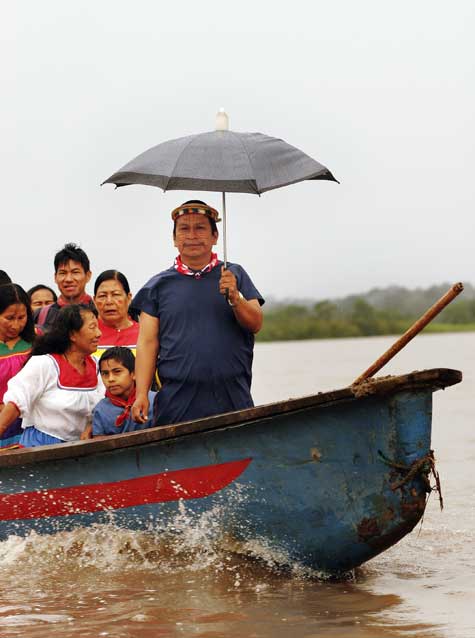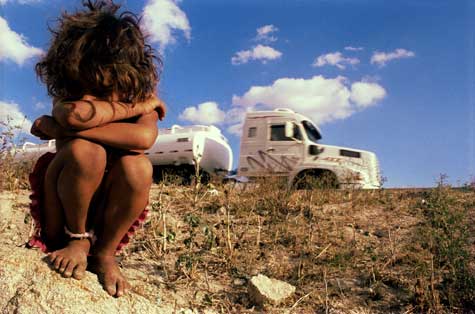 INVESTIGATING DAMAGE Joe Berlinger’s Crude. |
Among the issues you'll see tackled at the Camden International Film Festival this year are poverty, overfishing, peak oil, and the plight (and/or) ambition of children who grow up too quickly. Much of this is familiar turf for the fifth annual documentary festival, which takes over venues in Rockport, Rockland, and Camden from October 1 to 4. For the first time, though, CIFF founder and program director Ben Fowlie (who is just 28) is attempting to position the festival to make its mark on documentary filmmaking in New England itself.
"The New England filmmaking community is really spread out," Fowlie says. "It's not based anywhere . . . even in one state." A free, half-day forum on October 2, called "Points North," looks to give the industry a regional foundation. Representatives from the Sundance Institute, PBS's POV series, the Gucci Tribeca Documentary Fund, and (in a last-minute coup) Greg Rehm, the director of HBO Documentary Films -- people from what Fowlie refers to as "the palpable industry," who can offer "major funding sources for New England-based filmmakers" -- will participate in panels throughout the afternoon, which is open to up to 100 filmmakers or curious spectators.
The event not only boosts funding prospects for area filmmakers; it boosts the reputation of the festival itself. CIFF is an established presence in the Midcoast -- last year, the festival premiered a rough cut of Aron Gaudet's Maine troop-greeter documentary The Way We Get By, which has gone on to become one of the most-honored non-fiction films of 2009 -- but Fowlie has his eyes on drawing a wider audience. "If we continue on the same progression . . . we're expecting to break over 5000 [attendees] this year. We've grown 15-20 percent each of the past five years. We have a solid base; we know that we can count on the 4000 in the greater Midcoast region . . . [this year,] our focus is on Portland and Boston. We feel like it's our year this year."
The festival's program (and handsome new Web site, designed by Arlo Jamrog) bears this out. There are 37 features playing at CIFF this year, about double last year's total, and Fowlie's biggest filmmaker-celebrity get this year is AJ Schnack, the director of opening-night film Convention and one of the major figures in the documentary industry. "AJ, definitely, is big . . . He has the potential to say this festival rules, which would give us credibility we need to grow and keep going," Fowlie says. After the film, Schnack will discuss his piece on stage with Peter Davis, the Nation journalist and Academy Award-winning director of the 1974 Vietnam War documentary Hearts and Minds.
Apart from documentary-related art exhibits and nightly parties (featuring musicians Audrey Ryan, Arms &As. "The essence of a festival is building an energy and a feel in a short amount of time . . . [and] that is built by bringing artists into a community," Fowlie says. He expects the Saturday afternoon screening of Will Hyler's The Fish Belong to the People to be particularly popular and controversial. The film presents "issues that lots of people here don't want to talk about . . . because fishing is so important [to the local economy]," but poses concerns about environmental sustainability in our oceans. Experts on the field from both sides of the Atlantic and local fishermen will take part in the post-film discussion.
Descriptions of other highlights of the CIFF slate can be found below. Tickets for the festival are just $8.50 per film, or $65 or $100 for festival passes. A full schedule can be found atwww.camdenfilmfest.org.
 GROWING UP IN RURAL BRAZIL Because We Were Born is both bleak and beautiful. |
CONVENTION For more on the opening-night film, see our interview with director AJ Schnack.
THE RIVALS Kirk Wolfinger's winning take on the high school football rivalry between Cape Elizabeth and Mountain Valley High School, which premiered to great fanfare at this summer's Maine International Film Festival, gets another Maine screening.
OCTOBER COUNTRY Michael Palmieri and photographer Daniel Mosher collaborated on this harrowing drama, about Mosher's struggling family. Set in a town in New York's Mohawk Valley, whose economy relies almost exclusively on a munitions factory (and, therefore, continuing wars), the film devastatingly portrays a painful cycle of regrettable mistakes and circumstances -- abusive relationships, young motherhood, chain smoking -- passed down from one generation to the next. The women of the Mosher family examine the limitations life has handed them as supernatural elements take over October Country's fringes -- the film begins on one Halloween and runs through the next -- suggesting the Moshers are as haunted by their past as they are unable to escape it.